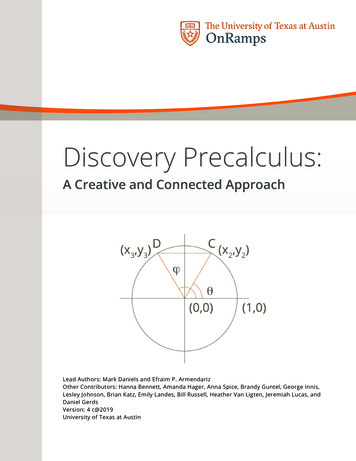
Transcription
Participant’s HandbookLESSON TWELVETWELVEIT’S EASY TO WINThe Secret to Increasingthe Power of Your Mind“Remember it takes no more effort to aim high inlife, to demand abundance and prosperity, than isrequired to accept misery and poverty.”Napoleon Hill161
Participant’s HandbookNOTESIn Lesson 12, we learnt it is easy to win if we take our life one day at a time.A successful life is nothing more than repeated successful days combinedtogether. To break it down, our life consists of years, months, weeks, daysand then even further to the activities and tasks of each day. This buildstowards our goals and a successful life, day by day.Imagine the Burj Khalifa building in Dubai, whichat the time of this publication is the tallestbuilding in the world, proudly standingat 829.8 metres tall which is just overan incredible half a mile high! Thereare 24,348 windows which takes 36workers three to four months to cleanthe entire exterior. Can you imaginewhen this building was literally nothing,just an empty plot of land? In fact, the43 metres in order to pour in 12,500cubic metres of concrete to support thebuilding. Although it was, of course,one day at a time, it was not one taskat a time that achieved this goal. Therewere many activities and tasks goingon simultaneously to build this recordbreaking building.So it is with your life. You can also literally multiply your effectiveness andget exponential results.TWELVEBut how can you multiply your effectiveness and results? We are goingto examine the methodology in Price Pritchett’s famous book titled ‘You2’in which he shares that you can achieve an, “explosive jump in your personalperformance that puts you far beyond the next logical step.” Every greatperson at some point has made a decision that they are not going to settlefor another logical step. They want an explosive jump. They have becomeaware that they truly do have potential. They can do great things. And theyare going to do great things, regardless of what anyone thinks or possiblyhow many failures they have had in the past.Making high velocity moves should be something we decideright now that we are going to learn how to execute.Pritchett also says, “It is a formula for stunning advances in achievementand the realisation of your dreams.” Formulas are helpful things. They simplifycomplicated, misunderstood concepts into easy terms. Here we are talkingabout stunning advancement in achievement.162
Participant’s HandbookNOTESImagine what that would mean to you? It gives your dream a strategy;a strategy that will turn your dream into a physical realisation.‘You2’ is not something you speed read. It is something to digest, to reallyPrice Pritchett adds, “The concept is one of exponential gains, rather thanincremental progress. You might compare it to multiplying instead of adding —it means a geometric progression in your effectiveness.”Now really think about what he is saying. You see the higher side of yourpersonality would truly love to multiply your effectiveness. This idea of onlye areliving in the space age, the age of quantum physics, space travel, instantcommunication. Let that run around your mind for a moment. You will notonly like the idea of multiplying your effectiveness, it will start to settle inyour mind and begin to feel very achievable.Pritchett went on to say, “That is exciting as well as provocative, but it getseven better.” Pritchett explained, “Remember, quantum leaps can come withoutapparent effort. These are high velocity moves that carry you to dramaticallyhigher performance levels without a time-consuming struggle.”What Price Pritchett explained in that statement, spells promise in great bigletters. In fact, it spells power, possibility and promise. This kind of thinkingwith the essence of who weare. According to the bestestimates of the wisest amongus, no one can accuratelyguess at our potential.Making high velocity movesshould be something we decideright now that we are going tolearn how to execute.“Never think linear about thefuture. Think in terms of leaps.Always expect the unexpected.”7 Wonders of JoyfulJubilant Learning163
Participant’s HandbookPrice Pritchett said, “Quantum leaps seem to violate common sense utterly!”It is clear that this kind of thinking does violate common sense.Thinking Into Character is a programme that is designed to cause youto move beyond common sense. Top level performers do not think in thelogical way or the way it has always been done.You must keep in mind that your paradigm controls your logic. If you aregoing to be making high velocity moves that carry you to dramatically higherlevels of performance, you are going to have to rid yourself of the logic thatis controlling you and probably everyone you associate with.The Wright Brothers were not logical. Hillary would never have reached thetop of Mount Everest. In fact, he would have never left the base camp if hewas letting logic control him. And if you want your dreams to manifest, yourresults to multiply, you are going to have to let go of logic, for now anyway.Pritchett continued, “The idea of ‘moving to a higher orbit’ and skipping severalrungs on the achievement ladder in the process, strikes people as far fetched,maybe even outrageous.” Pritchett is so accurate with that statement. If youhave spent any time discussing some of the big moves you are dreamingabout with other people, they are usually shot down by the masses asimpractical and ridiculous.Invariably, quantum leaps are not complex or intricate maneuvers.This is precisely why you have to be so very careful in selecting the peoplethat you want to brainstorm with, your own inner circle. Remember, themasses are controlled by paradigms.164NOTES
Participant’s HandbookNOTESThe Wright Brothers were a couple of crazy young bicyclemechanics from Dayton, Ohio who were thought to bementally unbalanced at times, even by their own father.The geniuses of the past: Edison, Ford, Einstein were not considered geniusesby their neighbours. They were very likely viewed as heretics, maybe borderingon insanity at times! It is generally only after people of this nature are gone,that they are elevated to the status ‘genius’. The Wright Brothers werea couple of crazy young bicycle mechanics from Dayton, Ohio who werethought to be mentally unbalanced at times, even by their own father.Now let us take a look at what Price Pritchett says after a person achieves greatthings. He writes, After the fact, quantum leaps may be viewed as practical,sensible, even obvious moves, but they typically do not come to you as theobvious moves at the moment. Usually it is in retrospect that you perceivetheir hidden logic and elegance. Invariably, quantum leaps are not complex orGreat advances come about when people have a deep understanding of theirtrue potential and a tremendous desire to lead others to greater levels. Theyrefuse to let logic control them and spend their days thinking in new dimensions,all the time performing at their very best at whatever they are doing.If you are not already living this way, make up your mind that you are goingto begin now. Turn it into a habit, you may decide to do it for half a day at atime. Start in the morning and give it everything you’ve got until noon. Thenat noon, start over again and give it everything you’ve got until the end of theday. Then, wake up tomorrow and start the same process over again.165
Participant’s Handbook2. KEY HIGHLIGHTSharder is not necessarily the solution‘You is an explosive jump in your personal Trying to achieving more. It may not offer any promisesperformance that puts you far beyond the next2’in terms of getting what you want out of life.Sometimes in fact, it is a big part of the problem.If you stake your hopes on a breakthroughby trying harder than ever, you may ruin yourchances for success.have been programmed as part of our Weparadigm, part of our habitual behaviour, totake logical, progressive steps.Every challenge is a learningopportunity. Get excited aboutthe opportunities to learn.166logical step. The concept is one of exponentialgains rather than incremental progress.leaps come without apparent effort. QuantumThese are high velocity moves that carry you todramatically higher performance levels withouta time consuming struggle. Quantum leaps canhappen by applying the concepts in this toolbox.challenge is a learning opportunity. EveryGet excited about the opportunities to learn.very selective about the people with whom Beyou share your dreams or thoughts of ‘You ’.2The vast majority of people have nounderstanding that they truly do have thepotential to multiply their effectiveness.
Participant’s Handbook3. WORKSHEETS1. What goal do you really want to achieve?2. How can you think in a different, non-logical way to achieve it?3. What steps would you take? How can you multiply your effectiveness?4. What do your results look like?167
Participant’s Handbook4. READING ARTICLEThe Common Denominator of Success - Adapted from Albert E.N. GraySeveral years ago, I was brought face to face with thevery disturbing realisation that I was trying to researchand explain what it took to be a success in sales,without knowing myself, what the secret of successreally was. And that, naturally, made me realise thatregardless of what other knowledge I might havebrought to my job, and to others, I was definitelylacking in the most important knowledge of all.Of course, like most of us, I had been broughtup on the belief that the secret of success is hardwork. Despite this, I had seen so many peoplewho worked hard and did’t succeed and others whosucceeded without working hard. Because of this,I had become convinced that hard work was notthe real secret, though in most cases it might beone of the requirements.Given my background and training, I began tryingto explain success by reviewing all relative researchon topics such as motivation, behaviour, performanceand job satisfaction. Next, I set out on a voyage ofdiscovery, which carried me through thousands ofbooks, magazine and newspaper articles, biographiesand autobiographies. I then conducted numerousresearch studies over a 20-year period.Because successful students dothings they do not like to do, theyare able to achieve their goals.After a time; theory, research results, and hearsayoverwhelmed me. Then, one day as I was daydreaming, everything I had done came into focus.My mind focused on the realisation that, the secretI was trying to discover, lay not only in what peopledid, but also in what made them do it.I realised further that the secret for which I wassearching, must not only apply to every definitionof success, but since it must apply to everyone towhom it is offered, it must also apply to everyonewho had ever been successful. In short, I waslooking for the common denominator of success.168But this common denominator of success is so big,so powerful, and so vitally important to your future andmine, that I’m not going to review all of the writingsand research, which have brought me to the commondenominator of success; I’m just going to tell you.People are creatures of habit. Everysingle qualification for success isacquired through habit.The common denominator of success – the secretof success of everyone who has ever been successful– lies in the fact that the person formed the habit ofdoing things that others don’t like to do. It’s just astrue as it sounds and it’s just as simple as it seems.You can hold it up to the light, you can put it to theacid test, and you can kick it around until it’s wornout, but when you are all through with it, it will stillbe the common denominator of success, whetheryou like it or not.It will explain why people have come with everyapparent qualification for success and then given usour most disappointing failures. It explains why othershave come in and achieved outstanding success inspite of many obvious and discouraging challenges.And since it will also explain your future, it wouldseem to be a good idea for you to use it to determinejust what sort of a future you are going to have.In other words, let’s take this big, all-embracingsecret and boil it down to fit you.If the secret of success lies in forming the habit ofdoing things that others don’t like to do, let’s startthe boiling down process by determining what arethe things that others don’t like to do. The things thatothers don’t like to do are the very things that youand I and other human beings, including successfulstudents, naturally don’t like to do. In other words,we’ve got to realise right from the start that successis something which is achieved by the minority ofpeople and is therefore unnatural; it is not achieved byfollowing what we normally like and don’t like, nor bybeing guided by natural preferences and prejudices.
Participant’s HandbookThe things that others don’t like to do, in general, aretoo many and too obvious for us to discuss here, andso, since our success is to be achieved, let us moveon to a discussion of the things that we don’t like todo. Here too, the things we don’t like to do are toomany to permit specific discussion, but they can allbe disposed of by saying that they all stem from onebasic dislike.Perhaps you have been discouraged by a feelingthat you were born subject to certain dislikes peculiarto you, which successful students do not possess.Perhaps you have wondered why it is that our beststudents seem to like to do things that you don’tlike to do. They don’t! And I think this is the mostencouraging statement I have ever offered to agroup of students.But if they don’t like to do these things, then whydo they do them? Because successful students dothings they do not like to do, so that they are able toachieve their goals. They are not influenced by howthey reach these goals, but rather by the results theycan obtain. Successful students are influenced by thedesire for pleasing results. Others are influenced bythe desire for pleasing methods and are inclined tobe satisfied with such results as can be obtained bydoing things they like to do.Any resolution or decision you makeis simply a promise to yourself, whichisn’t worth anything unless you haveformed the habit of making andkeeping that promise.PurposeWhy are successful students able to do thingsthey don’t like to do while others are not? Becausesuccessful students have a purpose strong enoughto make them form the habit of doing things theydon’t like to do.When Top Students SlumpSometimes even our best students get into a slump.When a person goes into a slump, it simply meanshe/she has reached a point at which, for the timebeing, the things he/she doesn’t like to do, havebecome more important than the reasons for doingthem. And I suggest to you, that when yougo into a slump, the less you talk about production,and the more you talk about ‘purpose,’ the sooneryou will pull yourself out of the slump.It’s not EnoughMany people with whom I have discussed thiscommon denominator of success, have said at thispoint, “But I’m just trying to get a degree to improvemy circumstance. Isn’t that enough of a purpose?”No it isn’t. It isn’t a sufficiently strong purpose tomake yourself form the habit of doing the things youdon’t like to do, for the very simple reason, that it iseasier to adjust to the hardships of getting by, witha mediocre school performance, than it is to adjustourselves to the hardships of excelling. If you doubtme, just think of all the things you are willing to gowithout in order to avoid doing the things you don’t liketo do. All of which seems to prove that the strength,which holds you to your purpose, is not your ownstrength but the strength of the purpose itself.Habit is The KeyNow let’s see why habit belongs so importantlyin this common denominator for success.People are creatures of habit. Every singlequalification for success is acquired through habit.People form habits and habits form futures. If you donot deliberately form good habits, then unconsciouslyyou will form bad ones. You are the kind of personyou are because you have formed the habit of beingthat kind of person. The only way you can changeis through habit.Perhaps you have attended classes in the past andhave been determined to do things that would makeyou successful, or more successful, only to find yourdecision or determination waning at just the timewhen it should be put into effect or practice.Here’s the answer. Any resolution or decision youmake is simply a promise to yourself, which isn’tworth anything unless, you have formed the habitof making and keeping that promise. And you won’tform the habit of making it, and keeping it, unlessyou link it with a definite purpose, that can beaccomplished by keeping it right at the beginning.In other words, any resolution or decision you maketoday, has to be made again tomorrow, and the nextday and the next, and so on.169
Participant’s HandbookThis decision not only has to be made each day, but ithas to be kept each day, for if you miss one day in themaking or the keeping of it, you have to go back andbegin all over again. But if you continue the process ofmaking it each morning, and keeping it each day, youwill finally wake up some morning a different person,in a different world, and you will wonder what hashappened to you and the world you used to live in.Make Your Purpose Based Upon WantsRemember, needs are logical while wants areemotional. Your needs only push you just so far.When your needs are satisfied, they will stop pushingyou. If, however, your purpose is in terms of wantsand desires, then your wants and desires will keeppushing you long after needs are satisfied and untilyour wants and desires are fulfilled.You Have a PurposeHere is what has happened. Your resolution ordecision has become a habit and you do not haveto make it, on this particular morning. The reasonyou seem like a different person, living in a differentworld, is because you have, for the first time in yourlife, become master of yourself and your likes anddislikes. This is done by surrendering to your purposein life. That is why behind every success there mustbe a ‘purpose,’ and that is what makes purpose soimportant to your future. In the last analysis, yourfuture is not going to depend on economic conditionsor outside influences of circumstances over which youhave no control. Your future is going to depend onyour purpose in life. So let’s talk purpose.What is One’s purpose?Purpose is something set up as an object or endto be attained. Occasionally purpose is referredto as someone’s personal mission statement. Insetting your purpose, or mission statement, firstcreate an imaginary ideal life you would like to live,in every respect. Your ideal life should be basedupon who you are, and where you are going in life.Let yourself dream big dreams. Let your mind floatfreely into the future.Wants or Needs?Human beings are motivated by needs and wants.A person’s needs result from a lack of somethingdesirable, such as food, car, clothes, or shelter.Wants are needs learnt by the person. They areoften seen as emotional or psychological and notpractical. For example, people need transportation,but want a car instead of a horse or a bicycle. Mostpeople want a luxury car instead of an inexpensiveused car or truck. Instead of watching the game ontelevision, some want season tickets at the Cowboy’sIrving Stadium. Instead of a five room house, somewant a twelve room house on two acres of land.Instead of working until one is 80, some want to retireat an earlier time in their life, mainly because theyhave not made their job satisfying for themselves.170Your future is going to depend onyour purpose in life.Recently, I was talking with a young man, wholong ago discovered the common denominatorof success without realising it. He had a definitepurpose in life and it was definitely a sentimentalor emotional purpose. He wanted his boy to gothrough college without having to work his waythrough as he had done. He wanted his little girlto avoid the hardships, which his own sisterhad to face in her childhood. He wanted his wifeand the mother of his children to enjoy the luxuries,comforts, and even necessities, which had beendenied to his own mother. He was willing to formthe habit of doing things he didn’t like to do in orderto accomplish this purpose.Not to discourage him, but rather to have himencourage me, I said to him, “Aren’t you going a littletoo far with this thing? There’s no logical reason whyyour son shouldn’t be willing and able to work hisway through college just as his father did. Of coursehe’ll miss many of the things that you missed in yourcollege life and he’ll probably have heartaches anddisappointments. But if he’s any good, he’ll comethrough just as you did. And there’s no logical reasonwhy you should slave in order that your daughtermay have things which your own sister wasn’t ableto have, or in order that your wife can enjoy comfortsand luxuries that she wasn’t used to before shemarried you.”He looked at me with a rather pitying look and said,“But Mr. Gray, there’s no inspiration in logic. Thereis no courage in logic. There is not even happinessin logic. There is only satisfaction. The only placelogic has in my life is in realisation that the moreI am willing to do for my wife and children, the moreI shall be able to do for myself.”
Participant’s Handbook5. ASSIGNMENTWrite your answers in the space provided below.1. What does success mean to you?2. How hard are you willing to work to achieve success?3. What habits do you need to implement to achieve success?4. Do you think your new habits will be difficult to implement? If so, what steps can you take to makesure you can repeat them each day so that your actions develop into habits?171
Participant’s HandbookNOTES172
to examine the methodology in Price Pritchett's famous book titled 'You2' in which he shares that you can achieve an, "explosive jump in your personal performance that puts you far beyond the next logical step." Every great person at some point has made a decision that they are not going to settle for another logical step.











